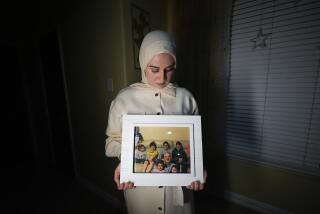Wife of Hostage Polhill Waits Stoically : Family: ‘I came to see my husband,’ Firyal Polhill says simply as she sits in a Damascus hotel.
- Share via
DAMASCUS, Syria — Firyal Polhill has never lost hope, and she came by car from West Beirut to see whether, this time, it would be fulfilled.
“I came to see my husband,” she said simply on Saturday, sipping tea in the lobby of her Damascus hotel.
Robert Polhill, a professor of business studies and accounting, was one of three American academics kidnaped from the campus of Beirut University College in January, 1987. Pro-Iranian militants claiming to hold the three hostages said Wednesday they would free one of them.
So far, it has not happened. Damascus-based diplomats say that perhaps today--perhaps Monday--it could happen.
“We hear rumors, speculation” but nothing definite, Polhill’s animated Palestinian wife remarked. She said that she had met Friday with U.S. Ambassador Edward Djerejian and that he “was encouraging.”
The wives and families of the eight Americans held hostage in Beirut have been through these moments of anxiety before--”the intense pressure,” she said--but this time, to Firyal Polhill, the reports seemed “more serious.”
She made the three-hour drive with the sister-in-law of Jesse Turner, another of the BUC academics. The third is Alann Steen.
The Haifa-born woman, Polhill’s second wife, said that she would be happy if any of the three were released. Even if a freed hostage is not her husband, she said calmly, “I hope I will get first-hand information about my husband.”
The hostage families are close and supportive, and those still living in Beirut stay in regular contact, sharing bits of news and talking about children and school.
A photo of Polhill accompanied last week’s second message from the kidnapers, saying that their original promise to release a hostage within 48 hours had been delayed.
“He looked good,” his wife said, mentioning that his beard had been neatly trimmed compared to earlier photos released by the militants. “He looked more relaxed.”
According to wire service reports, state-run Beirut television reported Saturday night that an unnamed American hostage would be freed and turned over to the U.S. ambassador here, “probably in the morning.”
In Washington, U.S. officials publicly acknowledged only cautious optimism but privately expressed anticipation of a weekend release. “At this point, we’re just waiting,” said a State Department spokesman. In Wiesbaden, West Germany, where a U.S. team was assembled in preparation for a release, a counterterrorism specialist said, “We’re in a holding pattern.”
A senior Bush Administration official said: “There’ll be a tremendous letdown if it doesn’t come off. We really believe this time it’s going to happen.”
Anticipation is so high that the United States requested and received permission from Syria on Saturday to land a specially equipped plane to fly a released hostage to Wiesbaden for medical treatment and debriefing.
Several ranking U.S. officials were planning to work today to deal with the repercussions of a release--and with efforts to win further releases.
But U.S. officials denied reports in the Middle East on Saturday that the release was linked to the unfreezing of some of Iran’s assets.
The officials noted that 18 such cases had been settled over the past five months, but they involved no major return of funds by the United States or payment by Iran.
“They were basically a wash,” he said. “People want to believe there’s a deal underneath all this. But this time there really isn’t.”
Williams reported from Damascus and Wright from Washington.
More to Read
Sign up for Essential California
The most important California stories and recommendations in your inbox every morning.
You may occasionally receive promotional content from the Los Angeles Times.













